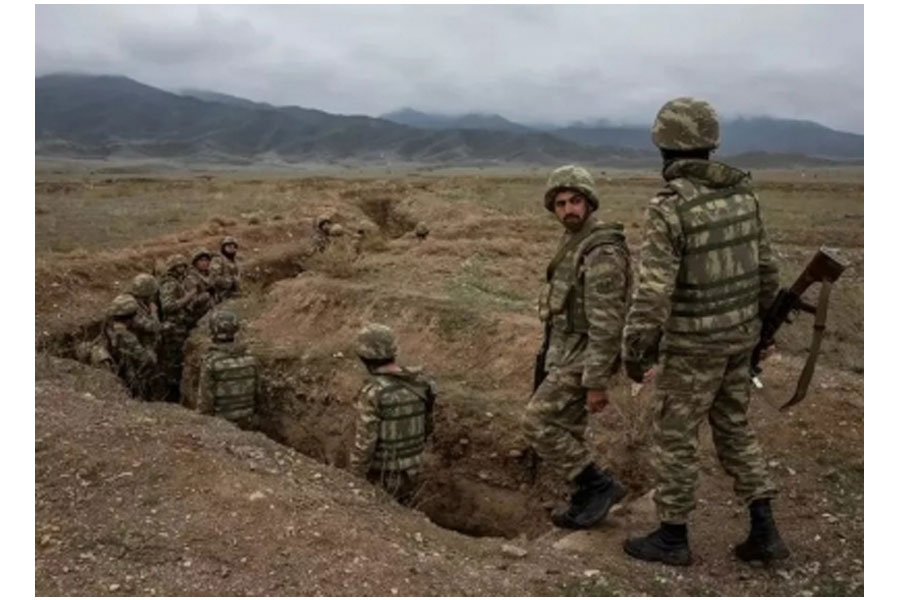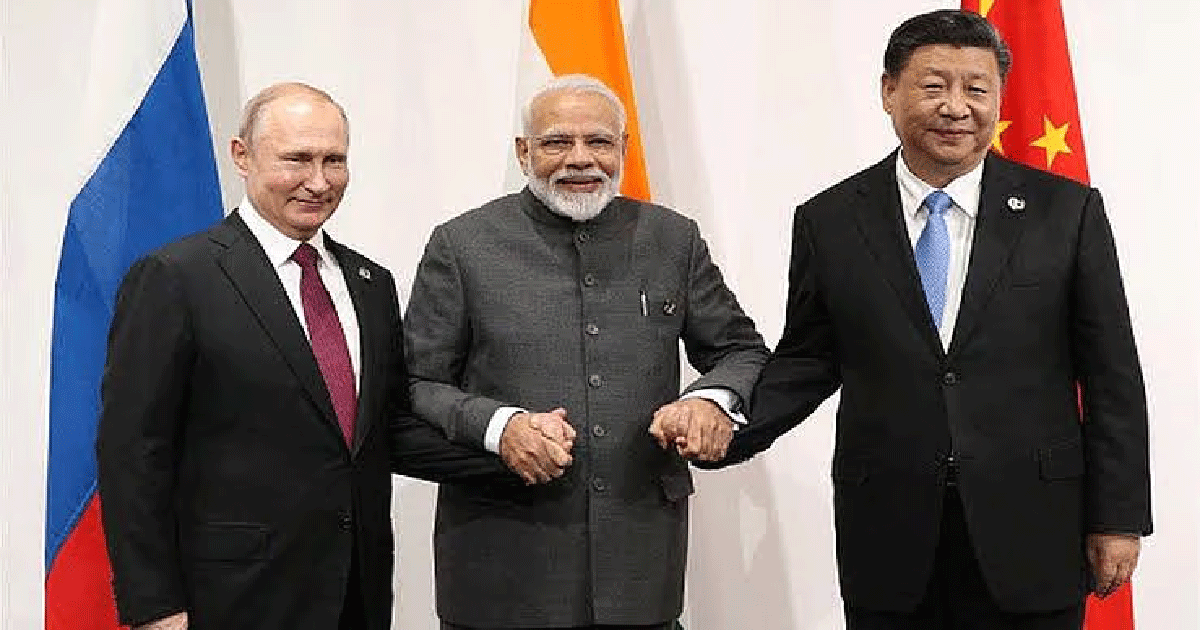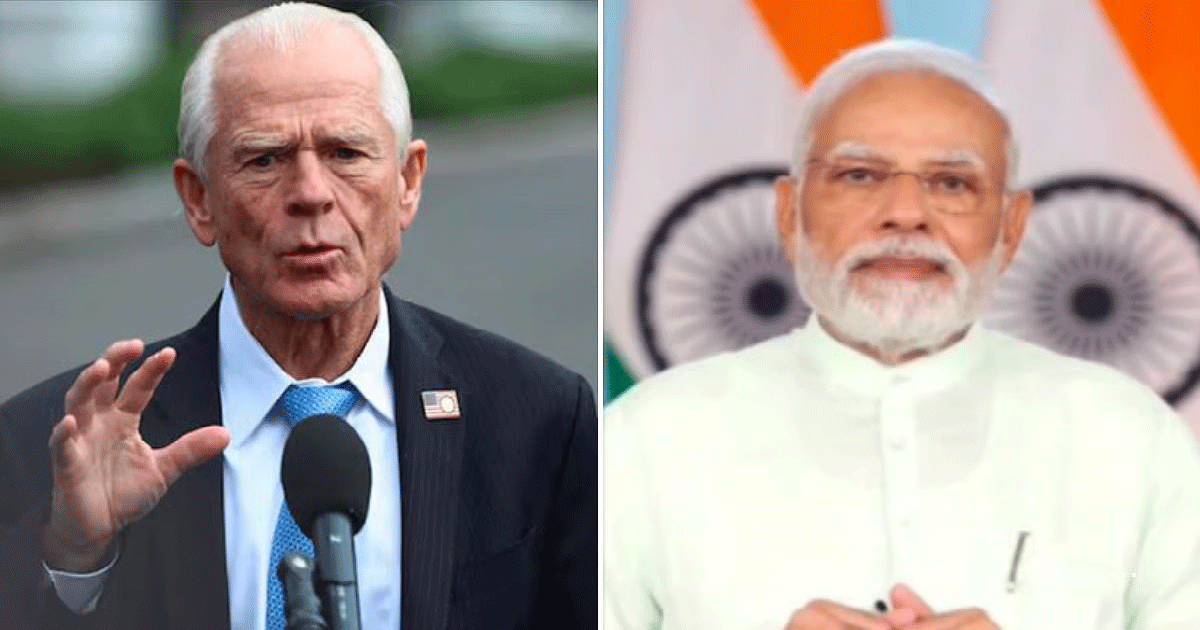International News
After war with Azerbaijan, Armenia taps India for military hardware

Recently in June, a defence delegation from the Republic of Armenia visited India, meeting with their counterparts here. The delegation came armed with a shopping list. While little is known about its contents, drones have been confirmed to have figured prominently on the list. But not drones alone, an official confirmed without going into any further details. This is not the first time that Armenia has evinced interest in Indian military hardware. In 2020, it concluded a deal with India worth 40 million for the supply of four indigenously built weapon-locating radars. The SWATHI radars have been developed by the Defence Research and Development Organisation (DRDO).
Since then, Armenia’s defence requirement has grown exponentially. “The Karabakh war made us rethink our defence needs,” said an Armenian official who did not want to be named. The war referred to the one the tiny South Caucasian nation fought with Azerbaijan over the contested territory of Nagorno-Karabakh. For twenty years the Armenians had held the ethnic Armenian enclave which technically formed part of Azerbaijan, as a result of the controversial borders drawn up during the erstwhile Soviet Union where the exercise was primarily based on keeping individual republics dependent on Moscow.
However, in 2020 Armenia lost all the territory to Azerbaijan, including the corridor that connected Armenia to the enclave. Though a member of the Russia-led Collective Security Treaties Organisation (CSTO), Russia refused to intervene in the war since it considered Nagorno-Karabakh to technically not be ‘Armenian territory’. Russian defence equipment also proved not to be a match for the Turkish equipment that was deployed, especially Turkish Bayraktar TB2 drones. Turkish military counsellors and arms won the war for Azerbaijan. “Russia intervened only when it felt Turkey would become a permanent presence in the region,” said the official bitterly. The result – a Russian peace keeping force in Nagorno-Karabakh. But the war also showed the limits of Western support and help for Armenia, as well as the limits of Armenian soft power -primarily its diaspora abroad, which is a source of pride for many Armenians. Armenia, even as located in a hostile neighbourhood, remains dependent on Russia. And Russia now remains focused on Ukraine.
The war has also isolated Armenia in other ways, by way of few foreign investments, decline in trade and commerce, exacerbated by the pandemic. Cash strapped Armenia has been unable to modernise its industrial base or step up its R and D. Armenian analysts bemoan the fact that the country has been unable to take advantage of China’s Belt and Road Initiative and coveted Chinese investments seemed to have bypassed the tiny country even as rivals Azerbaijan and Turkey have apparently benefitted. It is another matter that along with investments Armenia has also escaped the famous Chinese debt trap unlike similarly cash strapped Tajikistan, for instance. But its bilateral trade with China amounting to $873 USD is heavily tilted in favour of the latter. It would also be interesting to know how Armenian analysts view events in Sri Lanka.
This makes the situation very favourable for India. India’s ties with Armenia are civilizational, thanks to its diaspora, Armenia and India continue to share a unique bond. High profile visits have characterized bilateral relations, and new life was breathed into the relationship beginning with Prime Minister Narendra Modi’s meeting with Armenian President Nikol Pashashian in New York in September on the sidelines of the UN General Assembly. India sees Armenia not only as a friend but a good counterweight to Turkey whose President Recep Tayyip Erdogan has been particularly belligerent on the Kashmir issue, and followed a number of policies inimical to India, as well as to Azerbaijan, closely allied with Turkey and Pakistan.
Armenia is strategically located bordering Russia, Iran, Turkey. It is a significant part of multimodal trade routes. The Armenian North South Road Corridor is being developed to connect the Black Sea ports through the territory of Armenia and Georgia and further to Europe.
The implementation of the Project is expected to improve Europe – Caucasus – Asia road communication at the intersection of West Asia and East Europe. During his visit to Yerevan last year in October, External Affairs Minister S. Jaishankar pledged his support for the corridor. Earlier in 2021, Armenia was included in the virtual conference to commemorate the Chabahar Port. Its North South Corridor easily connects to the International North South Transport Corridor that India is involved in together with Russia and Iran. The first freight recently arrived through the INSTC from Russia to India. The Armenian Road Corridor becomes a natural part of the INSTC, which India has pitched for further linking to the Chabahar Port which it is helping develop.
This offers a valuable option to the BRI. India must therefore seize the opportunity to direct investments to the country, which will help to both develop the corridor, currently being funded by amongst others the Asian Development Bank, as well as resuscitate Armenia’s flailing economy. While China’s Confucius Institutes have made inroads and become quickly popular with Armenians, Indian soft power through Bollywood, Indian cuisine, and the centuries old Armenian diaspora in India has an edge. But it needs to be backed up by equally strong investments and trade. Current bilateral trade between India and Armenia hovers around a paltry $ 234 million. Of this Armenia enjoys the balance of trade but its main exports are minerals and metals. It is seeking to set up its manufacturing base and Indian companies and entrepreneurs with enormous experience can help in this.
Together with defence, trade, and investments, Armenia can become a strategically significant partner for India, where India can set up bases and a commercial and defence hub for joint manufacture and Indian exports beyond. Located in Russia’s sphere of influence, this is an additional advantage for India. Any Indian bases there should not be irksome to Russia, even as it offers an alternative to Armenia and will preempt China’s expanding footprint.
Business
India, Japan can diversify trade basket, open new frontiers with renewed efforts: PM Modi

Tokyo, Aug 29: Hailing the robust India-Japan economic and trade partnership, Prime Minister Narendra Modi on Friday said with renewed efforts, both nations can diversify their trade basket, make it more balanced, and open up new frontiers as well.
In an interview with Japanese newspaper The Yomiuri Shimbun, the Prime Minister said we must aim bigger and remain ambitious.
“The synergies across governments, businesses and people can create scale and speed in our economic partnership. As the world’s leading economies, we have been contributing to each other’s growth, competitiveness and dynamism,” PM Modi told the publication.
Japan has been a trusted partner in India’s infrastructure development across generations. The country has also been a leading source of foreign direct investment (FDI) for India in key sectors, including automobiles, electronics, telecom, chemicals, finance, and pharmaceuticals.
According to PM Modi, the number of Japanese firms in India has grown steadily to around 1,500, while more than 400 Indian companies operate in Japan.
“Clearly, this is only the beginning — the real potential is much higher,” he noted.
“We maintain important trade relations, but it has not yet reached the levels envisaged under our CEPA (Comprehensive Economic Partnership Agreement)… The 20th century saw Japan emerge as a major partner in India’s infrastructure development. I am confident that the 21st century will see Japan as a major partner in India’s innovation, manufacturing, and global value chains,” the Prime Minister emphasised.
On semiconductors, PM Modi told the publication that India’s semiconductor sector is on the cusp of transformation.
“We have put in place a comprehensive regulatory and policy framework, backed by incentives, to build a strong semiconductor and display ecosystem. Already, six semiconductor units are taking root in India, with four more on the way. By the end of this very year, ‘Made in India’ chips will be in the market, a clear demonstration of India’s design and manufacturing capabilities,” the Prime Minister said.
Japanese companies, with their technological strengths and global leadership, can play a pivotal role in this journey, he said, adding that a strong beginning has already been made.
“By combining India’s scale and capabilities with Japan’s advanced technologies, we can build a resilient and trusted semiconductor value chain,” PM Modi stressed, adding that this collaboration will support the technological ambitions of both our countries and enhance global supply chain security.
“I see semiconductor cooperation emerging as a major pillar of the India–Japan partnership. After all, in this digital century, chips are not just about computers, they are about competitiveness, credibility and confidence in the future,” he mentioned.
Some Japanese companies are positioning their production bases in India as hubs for third-country markets such as Africa.
According to PM Modi, India has seen multi-faceted reforms which make manufacturing in India easier than ever before.
“We have removed compliance burdens, rolled out incentives and ensured a large skilled workforce for companies to set base in India. Many global companies, including those from Japan, are setting up their production in India not only to cater to our domestic market, but also for the world,” he highlighted in his response.
Japanese automaker Suzuki Motor Corporation this week announced it will invest Rs 70,000 crore in India over the next five to six years. The investment will be used to increase production, introduce new car models, and protect its leadership position in the world’s third-largest automobile market.
“Just a couple of days back, I was at the Suzuki plant in India where we flagged off electric vehicles to be exported to a hundred countries, including Japan,” said PM Modi.
International News
PM Modi’s China Visit: Bilateral Talks With Xi Jinping & Vladimir Putin Confirmed At SCO Summit Amid Trump’s Tarrif Row

New Delhi: Prime Minister Narendra Modi will hold bilateral meetings with Chinese President Xi Jinping on August 31 and Russian President Vladimir Putin on September 1 in Tianjin, during the Shanghai Cooperation Organisation (SCO) summit.
The talks come at a sensitive moment, as India grapples with strained economic ties with the United States following tariff hikes by President Donald Trump.
India’s relationship with China, though still fragile, has shown signs of cautious improvement after years of confrontation. Tensions had escalated after the deadly Galwan Valley clashes in June 2020, but sustained diplomatic and military engagements have since led to withdrawals from some key friction points along the Line of Actual Control.
Despite heavy deployments, both sides have worked to lower the risk of fresh escalation. This will mark Modi’s first visit to China in more than seven years, his last being the informal Wuhan summit with Xi in 2018. The upcoming meeting is expected to test whether the managed thaw between the two Asian neighbours can move into a more stable phase.
The meeting with Putin is equally significant. With Moscow under Western sanctions over the Ukraine war, Russia is seeking to reinforce its traditional partnership with India while expanding its alignment with China. Officials have hinted at possible trilateral discussions involving India, Russia and China, which may surface in the Modi-Putin talks.
The wider SCO summit will draw leaders from across Central Asia, South Asia, the Middle East and Southeast Asia. For China, it represents a stage to assert leadership of the Global South and to extend diplomatic support to Russia. For India, the gathering provides an opportunity to reaffirm its place in multilateral forums and present itself as a balancing force in shifting global alignments.
International News
‘Modi’s War’: White House Trade Advisor Peter Navarro Blames India’s Oil Purchase For Ukraine-Russia Conflict

Washington, DC: White House Trade Advisor Peter Navarro has referred to the Russia-Ukraine conflict as “PM Modi’s war,” criticising India for purchasing discounted crude oil from Moscow.
In an interview with Bloomberg, Navarro blamed India for being the reason behind the US and Europe funding Ukraine against Russia’s aggression.
“Ukraine comes to us and Europe and says give us more money (for its war). Everybody in America loses because of what India is doing. Consumers and businesses lose, workers lose because India’s high tariffs cause jobs, income and higher wages. The taxpayer lose because we got to fund Modi’s war.” Navarro told Bloomberg.
He added, “The road to peace runs atleast partly through New Delhi.”
The White House trade advisor further termed India “arrogant” over prioritising its energy needs and advised it to “side with democracies.”
“The Indians are so arrogant about this. They say we don’t have higher tariffs. It’s our sovereignty. We can buy oil from anyone we want. India, you’re the biggest democracy in the world. Okay? Act like one. Side with the democracies,” Navarro said.
Navarro further attacked India for smoothening its ties with China, expressing his frustration over India’s growing relations with Moscow and Beijing, whom he labelled as “authoritarians.”
“You’re getting in bed with the authoritarians. China, you’ve been at quiet war with them for decades. They invaded Aksai Chin and all your territory. These are not your friends, folks. Okay? And the Russians, I mean, come on,” Navarro told Bloomberg.
Navarro’s remarks come after the 50 per cent tariffs on Indian goods imposed by the Donald Trump administration came into force on Wednesday. Of the 50 per cent tariffs, 25 per cent are imposed because of India’s continued purchases of Russian oil and military equipment, which the Ministry of External Affairs has described as “extremely unfortunate” and reiterated its stand to protect its national interest.
“In an official statement, the MEA said, “The United States has in recent days targeted India’s oil imports from Russia. We have already made clear our position on these issues, including the fact that our imports are based on market factors and done with the overall objective of ensuring the energy security of 1.4 billion people of India.”
“It is therefore extremely unfortunate that the US should choose to impose additional tariffs on India for actions that several other countries are also taking in their own national interest,” the statement added.
External Affairs Minister S Jaishankar has also responded to criticism of India by American officials for its energy ties with Russia, and said the US itself had asked New Delhi to help stabilise global energy markets by buying Russian oil.
Jaishankar called out the US logic to impose tariffs on India, despite China being the biggest purchaser of Russian oil and the EU being the biggest purchaser of LNG.
“We are not the biggest purchasers of Russian oil; that is China. We are not the biggest purchasers of LNG, that is the European Union. We are not the country which has the biggest trade surge with Russia after 2022; I think there are some countries to the South. We are a country where the Americans have said for the last few years that we should do everything to stabilise the world energy market, including buying oil from Russia. Incidentally, we also buy oil from the US, and that amount has increased. So honestly, we are very perplexed at the logic of the argument that you (the media) had referred to…” Jaishankar had said in response to a query during a joint press briefing with Russian foreign minister Sergey Lavrov in Moscow.
Not just Indians but US politicians and economists have also responded to US efforts to strong-arm New Delhi.
Earlier, renowned economist Jeffrey Sachs had strongly criticised the US administration’s decision to impose steep tariffs on India, calling them “bizarre” and “very self-destructive of US foreign policy interests”.
In a recent interview with ANI, Sachs expressed concerns that these tariffs will undermine years of efforts to strengthen US-India relations. Sachs described the tariffs as “not a strategy, but sabotage” and the “stupidest tactical move in US foreign policy”, which has unified the BRICS countries like never before.
Nikki Haley, former US Ambassador to the United Nations, has emphasised the importance of treating India as a “prized free and democratic partner” in the global effort to counter China’s growing influence. In her opinion piece on Newsweek, she warned that damaging the 25-year momentum in US-India relations would be a “strategic disaster.”
She urged Donald Trump to “reverse the downward spiral” and hold direct talks with PM Modi. “The sooner the better,” she said.
-

 Crime3 years ago
Crime3 years agoClass 10 student jumps to death in Jaipur
-

 Maharashtra11 months ago
Maharashtra11 months agoMumbai Local Train Update: Central Railway’s New Timetable Comes Into Effect; Check Full List Of Revised Timings & Stations
-

 Maharashtra11 months ago
Maharashtra11 months agoMumbai To Go Toll-Free Tonight! Maharashtra Govt Announces Complete Toll Waiver For Light Motor Vehicles At All 5 Entry Points Of City
-

 Maharashtra12 months ago
Maharashtra12 months agoFalse photo of Imtiaz Jaleel’s rally, exposing the fooling conspiracy
-

 National News11 months ago
National News11 months agoMinistry of Railways rolls out Special Drive 4.0 with focus on digitisation, cleanliness, inclusiveness and grievance redressal
-

 Crime11 months ago
Crime11 months agoBaba Siddique Murder: Mumbai Police Unable To Get Lawrence Bishnoi Custody Due To Home Ministry Order, Says Report
-

 Maharashtra10 months ago
Maharashtra10 months agoMaharashtra Elections 2024: Mumbai Metro & BEST Services Extended Till Midnight On Voting Day
-

 National News12 months ago
National News12 months agoJ&K: 4 Jawans Killed, 28 Injured After Bus Carrying BSF Personnel For Poll Duty Falls Into Gorge In Budgam; Terrifying Visuals Surface












